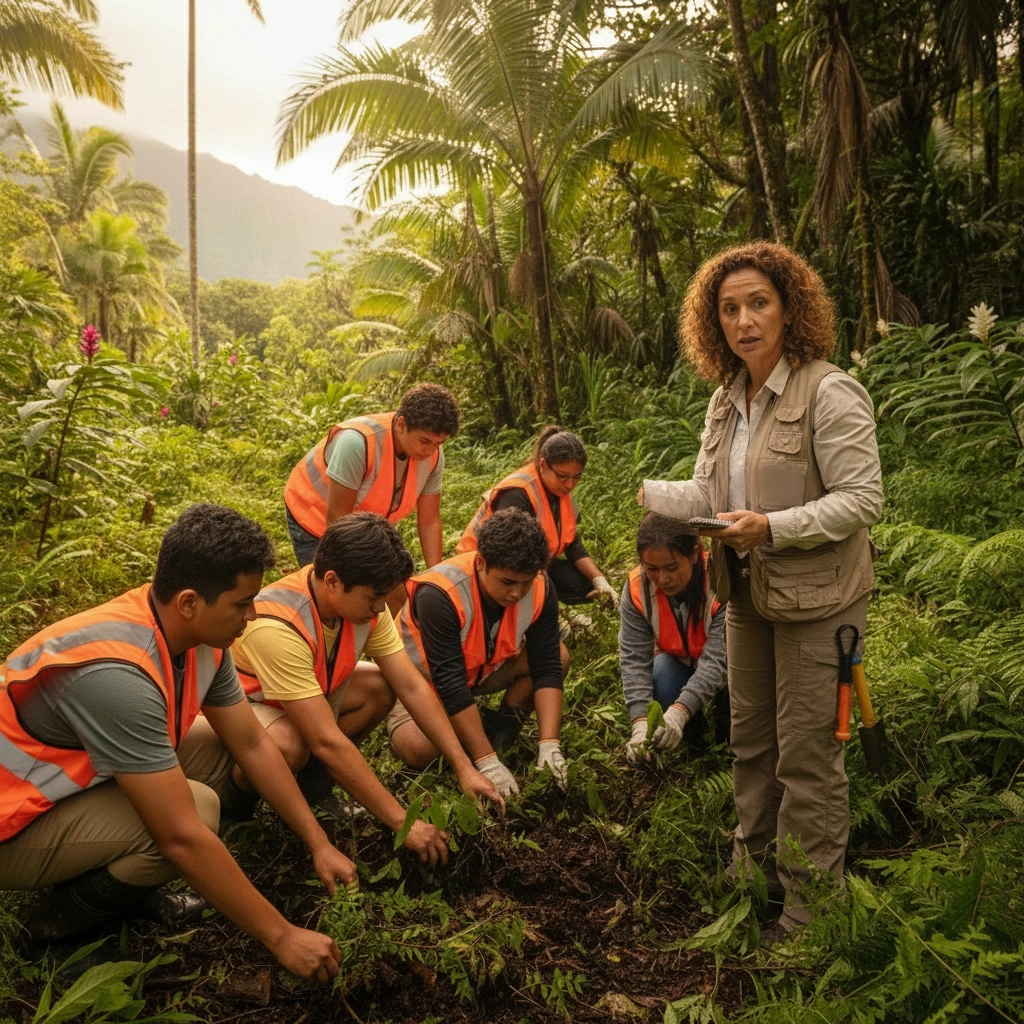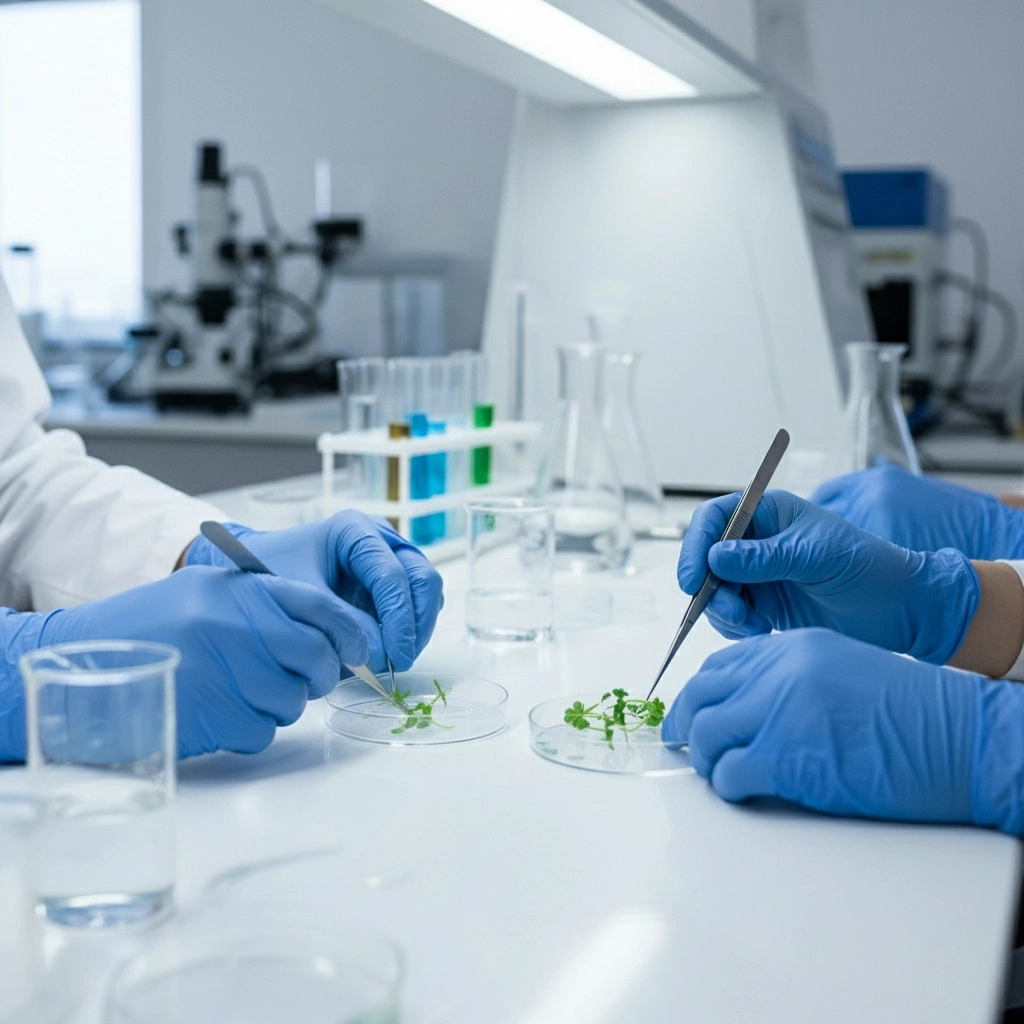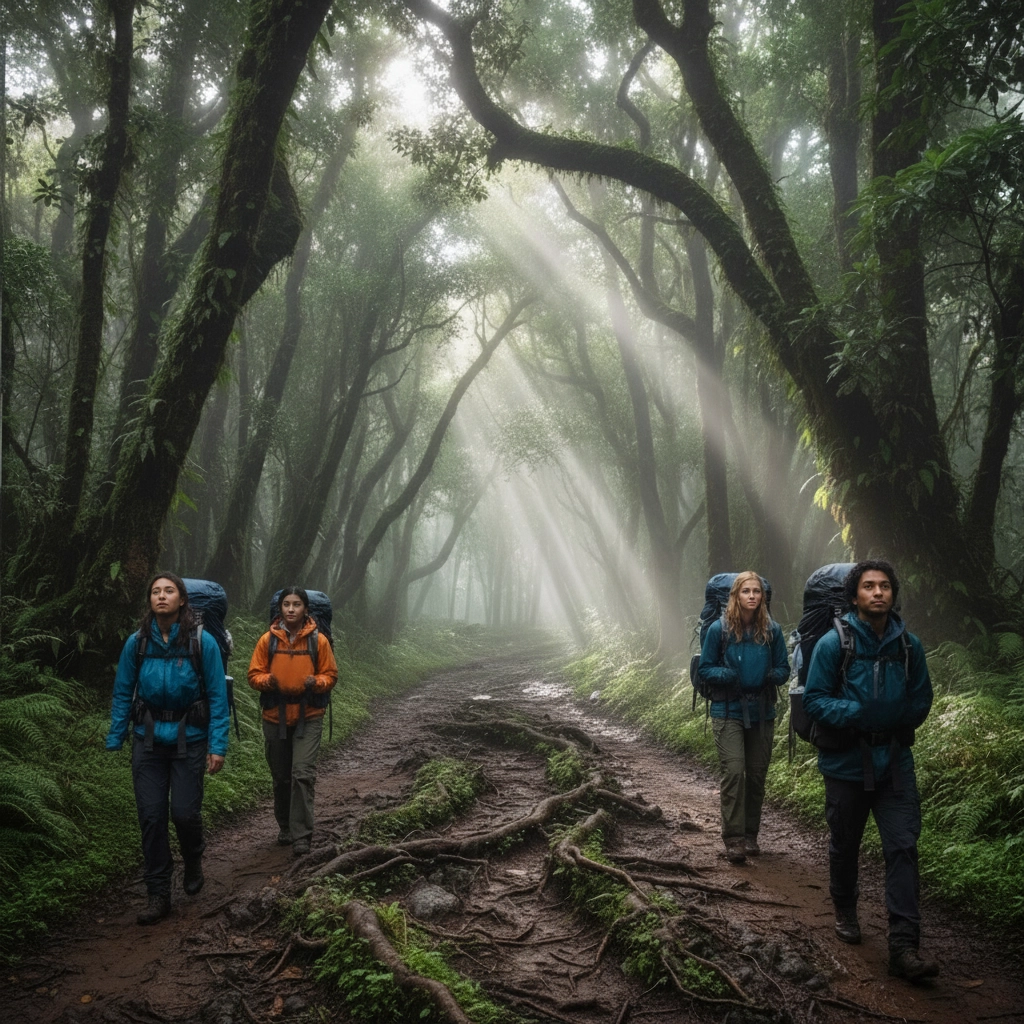Volunteering in Hawaii: Supporting Scientists at Lyon Arboretum to Protect the Rainforest
- Caleb Mullenix
- Oct 30, 2025
- 5 min read
Educational travel experiences that combine hands-on learning with meaningful service create transformative opportunities for students to engage with real-world conservation challenges. At Lyon Arboretum in Hawaii's Mānoa Valley, students participating in Appleseed Expeditions' service learning trips work directly alongside research scientists to protect one of the world's most biodiverse tropical rainforest ecosystems while developing critical scientific skills and environmental stewardship values.
Understanding Lyon Arboretum's Conservation Mission
Located on the island of Oʻahu within a tropical rainforest zone receiving approximately 150 inches of annual rainfall, Lyon Arboretum serves as a research unit of the University of Hawaiʻi dedicated to inspiring and cultivating the conservation of tropical plant biodiversity. This 190-acre living laboratory maintains over 5,000 unique plant and tree species from around the world, creating an unparalleled outdoor classroom for wildlife conservation student travel programs.
The Arboretum's mission extends far beyond plant collection and display. Scientists and researchers at Lyon Arboretum focus on critical conservation work that directly impacts Hawaii's water security and native ecosystem health. The forests surrounding the Arboretum function as natural "sponges" that capture the island's fresh water: the primary source of potable water for Hawaii's residents. When students volunteer in these conservation efforts, they contribute to protecting this vital water catchment system while learning about the interconnected relationships between forest health, water security, and community wellbeing.

Hands-On Learning Through Scientific Research
Students participating in alternative breaks for students at Lyon Arboretum engage in authentic scientific research alongside professional botanists, horticulturists, and conservation biologists. These educational travel experiences provide direct exposure to field research methodologies, data collection techniques, and conservation protocols used by working scientists.
Research activities include invasive species identification and removal, focusing particularly on high-threat plants like Ardisia virens and Stromanthe tonckat: species found exclusively at Lyon Arboretum that pose significant risks to native forest ecosystems if allowed to spread. Students learn to identify these invasive species using field guides and scientific keys, understand their ecological impacts, and participate in systematic removal efforts that prevent their establishment in higher-elevation native forests.
The micropropagation laboratory offers students opportunities to observe and assist with tissue culture techniques used to propagate rare and endangered Hawaiian plants. This hands-on experience introduces students to biotechnology applications in conservation while demonstrating how scientific innovation supports species preservation efforts.
Service Learning Components and Educational Outcomes
Appleseed Expeditions structures these hands-on learning trips to maximize both service impact and educational value. Students participate in multiple service components designed to address the Arboretum's most pressing conservation needs while developing transferable skills and environmental awareness.
Grounds and Trail Maintenance: Students work in teams to maintain hiking trails, remove invasive weeds from botanical collections, and assist with general grounds maintenance. These activities teach students about habitat management while providing essential support for the Arboretum's operations. Trail maintenance work requires students to navigate challenging terrain safely, developing problem-solving skills and physical resilience.
Educational Program Support: Students assist education department staff in developing and implementing public outreach programs, creating educational materials, and supporting guided tours for visiting groups. This component enhances communication skills while deepening students' understanding of conservation messaging and environmental education techniques.
Data Collection and Monitoring: Research staff involve students in ongoing monitoring projects, teaching proper data collection protocols for measuring plant growth, documenting species distribution, and tracking restoration project success. Students learn to use scientific equipment, maintain accurate field notebooks, and understand the importance of long-term monitoring in conservation research.

Preparing Students for Tropical Rainforest Conditions
Ensuring the safety and success of students participating in wildlife conservation student travel requires comprehensive preparation for Hawaii's tropical rainforest environment. The Mānoa Valley location presents unique challenges and opportunities that demand careful planning and appropriate equipment.
Environmental Conditions: Students must prepare for high humidity, frequent rainfall, and temperatures that can reach extreme levels, particularly in greenhouse environments. The tropical climate supports abundant insect populations, including mosquitoes, requiring appropriate clothing and protective measures. Terrain can be steep, uneven, and muddy, demanding proper footwear and physical conditioning.
Equipment and Clothing Requirements: Students should pack lightweight, quick-drying clothing in neutral colors, waterproof rain gear, closed-toe hiking boots with good traction, sun protection including hats and sunscreen, insect repellent, and work gloves suitable for handling plants and tools. Hydration systems and electrolyte supplements are essential for maintaining health in hot, humid conditions.
Safety Protocols: All student groups follow established safety protocols including buddy systems for trail work, regular hydration breaks, heat illness prevention measures, and emergency communication procedures. Students receive thorough orientation on identifying and avoiding hazardous plants, proper lifting techniques for heavy materials, and protocols for working with scientific equipment and chemicals in laboratory settings.
Cultural Connections and Environmental Justice
Lyon Arboretum's location in Hawaii provides unique opportunities for students to explore connections between environmental conservation and cultural preservation. The arboretum maintains collections of native Hawaiian plants that hold deep cultural significance, offering students insights into traditional ecological knowledge and indigenous land management practices.
Students learn about the cultural importance of native species like koa, ʻōhiʻa, and native ferns, understanding how plant conservation directly supports cultural continuity for Native Hawaiian communities. These educational travel experiences emphasize environmental justice themes by exploring how conservation efforts must address both ecological and social needs to be truly sustainable.

Long-Term Impact and Career Connections
Participation in hands-on learning trips at Lyon Arboretum frequently inspires students to pursue careers in environmental science, conservation biology, horticulture, and related fields. The direct exposure to working scientists and authentic research environments helps students understand potential career paths while developing practical skills valued by employers and graduate programs.
Many former participants report that their Lyon Arboretum experience influenced their academic choices, career decisions, and ongoing commitment to environmental stewardship. The combination of scientific rigor, meaningful service, and cultural learning creates lasting impacts that extend far beyond the trip duration.
Alumni networks from these programs often continue collaborative conservation work, pursue advanced degrees in environmental fields, and maintain connections with Lyon Arboretum research staff. These ongoing relationships demonstrate the lasting value of immersive educational travel experiences that combine service learning with professional mentorship.
Program Implementation and Educational Standards
Appleseed Expeditions designs Lyon Arboretum programs to align with Next Generation Science Standards and environmental education best practices. Programs incorporate pre-trip preparation activities, daily reflection sessions, and post-trip follow-up projects to maximize learning retention and skill development.
Pre-Trip Preparation: Students complete research projects on Hawaiian ecosystems, invasive species biology, and conservation challenges. This preparation ensures students arrive with foundational knowledge necessary for meaningful participation in research activities.
Daily Learning Structure: Each day combines direct service work with structured learning opportunities including scientist presentations, field research instruction, and guided exploration of botanical collections. Evening reflection sessions help students process experiences and connect daily activities to broader environmental concepts.
Assessment and Documentation: Students maintain detailed field journals, participate in group presentations, and complete capstone projects that demonstrate understanding of conservation principles and research methodologies. These assessments provide evidence of learning while creating lasting records of student contributions to conservation efforts.
These service learning trips to Lyon Arboretum represent the highest standards of educational travel, combining rigorous scientific learning with meaningful conservation service. Students return home with enhanced environmental awareness, practical research skills, and deep appreciation for the complexity and importance of biodiversity conservation. For educators seeking transformative hands-on learning trips that inspire environmental stewardship while meeting academic standards, Lyon Arboretum programs demonstrate the profound impact possible when students engage directly with working scientists in authentic conservation settings.



Comments